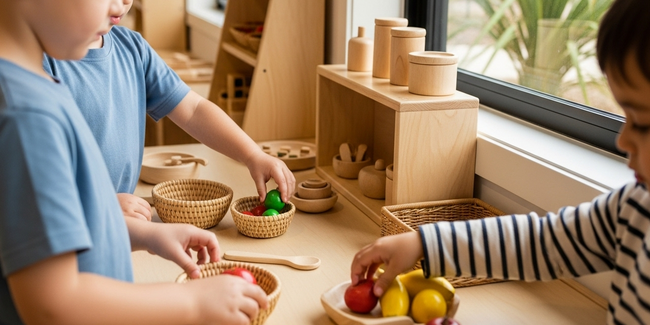Ever watched your toddler have a serious conversation with a teddy bear or meticulously ‘cook’ a meal of wooden blocks? It might look like simple fun, but you’re witnessing one of the most powerful learning processes in early childhood. This is dramatic play, and it’s not just a pastime; it’s the rich, fertile ground where the foundations for real-world skills are built.
Many parents wonder if this type of play is contributing to “real learning.” The answer, grounded in decades of developmental science, is an emphatic yes. As early childhood experts with over 15 years of experience guiding Sunshine Coast families, we want to peel back the curtain and show you the profound developmental science behind your child’s imaginative world.
This article is our commitment to empowering you. We will walk you through the proven benefits, the essential elements of a safe play space, and your crucial role in nurturing this vital stage of learning—all grounded in the principles of Australia’s leading Early Years Learning Framework (EYLF). We believe that when parents understand the ‘why,’ they become the most powerful partners in their child’s journey.
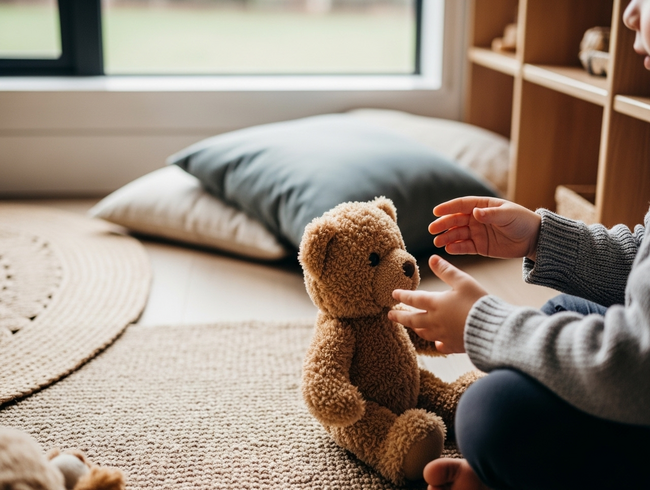
The ‘Why’ Behind the Play: Unpacking the Developmental Science
Dramatic play is the laboratory where children experiment with life. It’s where they process their world, test social boundaries, and build the neural pathways essential for higher-level thinking. At its core, this type of play directly supports the EYLF’s vision of helping children develop a strong sense of Belonging, Being, and Becoming.
Here’s what’s truly happening when your child is lost in their own world:
1. Building the Cognitive Blueprint (Problem-Solving & Symbolic Thinking)
When a child uses a banana as a telephone, they are engaging in symbolic thinking—the ability to let one object represent another. This is the exact same cognitive skill required to understand that the letters ‘c-a-t’ represent a furry animal or that the numeral ‘3’ represents a quantity. Dramatic play is, in essence, the training ground for literacy and numeracy.
Furthermore, consider a scenario where children are pretending to be firefighters. A “fire” breaks out, and the hose (a piece of rope) is tangled. They must communicate, collaborate, and strategise to untangle it. This isn’t just a game; it’s a complex problem-solving exercise that develops executive functions like planning, negotiating, and impulse control.
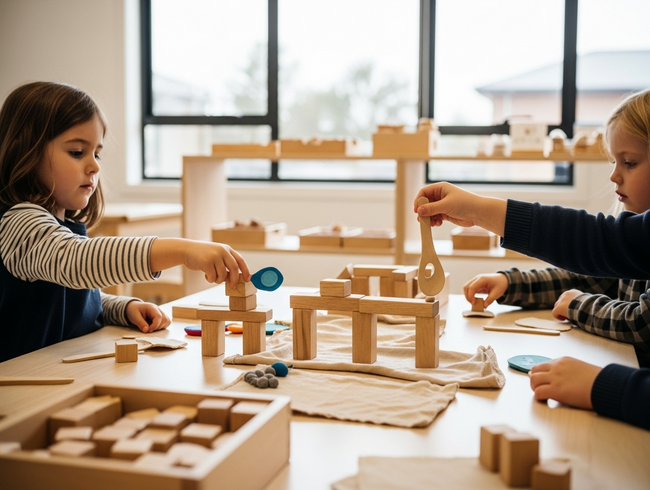
2. Nurturing the Social-Emotional Heart (Empathy & Self-Regulation)
Dramatic play is a child’s first opportunity to literally step into someone else’s shoes. By pretending to be a doctor comforting a “sick” doll or a parent soothing a crying baby, they are actively practising empathy. They explore a spectrum of emotions in a safe context, learning how to identify and manage feelings in themselves and others.
When a disagreement arises—”I wanted to be the chef!”—children are pushed to negotiate, compromise, and regulate their emotional responses. These moments, guided gently by an adult, are invaluable lessons in building resilience and social competence, cornerstones of emotional intelligence that will serve them for life.
3. Weaving the Fabric of Language and Communication
The language used during pretend play is often richer and more complex than in everyday conversation. Children experiment with new vocabulary they’ve overheard (“I need to check your temperature with my stethoscope!”), practise conversational turn-taking, and learn to use language to explain ideas and direct action. They are narrating stories, creating characters, and building worlds with their words. This narrative practice is a powerful precursor to strong reading comprehension and creative writing skills.
At Okinja Early Learning Centre & Kindergarten, our play-based philosophy is built upon this deep understanding. We see play not as a break from learning, but as the very vehicle for it. In line with the National Quality Standard (NQS) Element 1.1.2, which champions child-led learning, we create environments that invite children to become the authors of their own play, confident that they are building the essential skills for lifelong success.
Setting the Stage: The Essentials of a Safe and Inspiring Play Space
Creating a space for dramatic play at home doesn’t require expensive toys or elaborate setups. It requires thoughtfulness and an understanding of what truly sparks a child’s imagination. Our approach is guided by the same principles that inform our own purpose-built facility: safety, accessibility, and inspiration.
Location, Location, Location:
Choose a spot where play can remain set up for a while, honouring the child’s ongoing narrative. It could be a corner of the living room or their bedroom. The key is that it’s accessible and doesn’t need to be completely packed away each day. This allows for deeper, more sustained engagement.
Safety as the Foundation:
As an Approved Provider meeting National Quality Standards, safety is our non-negotiable priority. At home, this means:
- Check Your Props: Ensure all items are age-appropriate, non-toxic, and free from small parts that could be choking hazards for younger children.
- Sturdy Setups: Any structures, like a draped table or a cardboard box fort, should be stable and allow for easy entry and exit.
- Tidy and Organised: While play can be messy, the underlying organisation should be simple. Use low, open baskets or tubs so children can see their options and, crucially, help with tidying up. This fosters a sense of responsibility and respect for their environment.
The Power of Open-Ended Materials:
The best props are often not toys at all. They are simple, open-ended items that can become anything. A cardboard box is not just a box; it’s a car, a spaceship, a cave, a boat. A piece of silk can be a cape, a river, a blanket, or a royal robe. These materials empower children by not prescribing a single way to play.
This principle is the cornerstone of our play-based philosophy at Okinja. We believe the environment acts as the ‘third teacher,’ and by providing natural, unstructured materials—many inspired by our beautiful Sunshine Coast surroundings—we empower children to direct their own learning.
Igniting Imagination: Practical, Low-Cost Ideas for Your Dramatic Play Area
Here are three theme ideas you can easily adapt at home using items you likely already have.
1. The Everyday Hero: The Home Corner
This classic setup allows children to make sense of the routines and roles they see every day.
- Props: An old apron, plastic plates and cups, empty (and cleaned) food containers, a toy phone or an old remote, dolls or soft toys to be cared for, and a small table and chairs.
- The Learning: Children rehearse daily life, practise nurturing skills, and engage in rich conversational turn-taking.
2. The Community Helper Hub: Doctor’s Office, Vet Clinic, or Fire Station
This theme helps children process experiences that can sometimes be intimidating, like a visit to the doctor, and builds an appreciation for community roles.
- Props: A simple first-aid kit with cotton balls and bandages, a toy stethoscope (or one made from a paper towel roll), a clipboard with paper for “notes,” and stuffed animals as patients.
- The Learning: This fosters empathy, introduces new vocabulary, and helps children understand how people in their community help one another.
3. The Nature Explorer’s Basecamp
Drawing inspiration from our incredible Sunshine Coast environment, this theme connects children to the natural world.
- Props: A basket with interesting leaves, smooth stones, and seed pods collected on a walk. Binoculars made from toilet paper rolls, a magnifying glass, a notebook for drawing discoveries, and a hat. Drape a sheet over two chairs to create a “research tent.”
- The Learning: This encourages observation, scientific curiosity, and respect for the environment. It’s a perfect example of how the world right outside your door can be the greatest resource for play. This philosophy is at the heart of our centre, where our four unique playgrounds and proximity to Alex Forest Bushland Park provide endless inspiration for authentic, nature-based play.
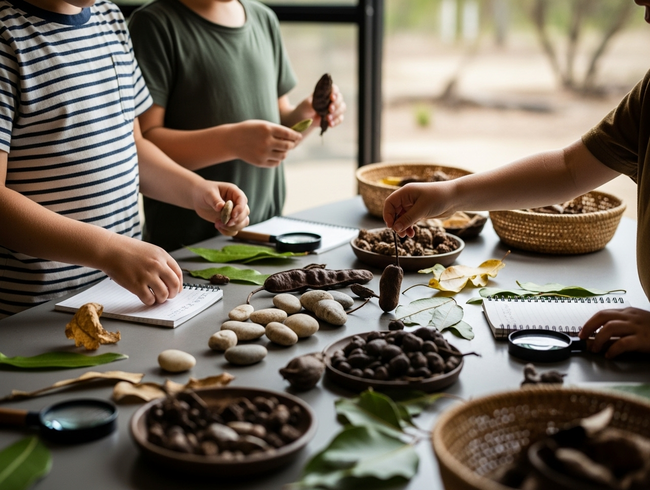
The Parent’s Role: How to Guide Without Taking Over
Your role in your child’s dramatic play is that of a supportive co-adventurer, not a director. Knowing when to step in and when to hang back is a skill, but here are a few guiding principles our highly qualified educators use every day.
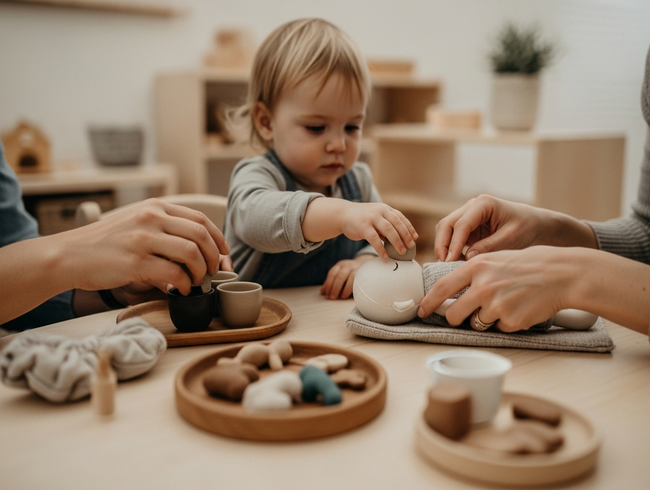
- Be a Thoughtful Observer: First, just watch. Notice the themes your child is exploring. Are they repeatedly acting out a specific scenario? This can give you incredible insight into what’s on their mind.
- Be a Willing Co-Player: If invited, join in! But let your child lead. If they hand you the banana-phone, answer it. If they serve you a mud pie, compliment the chef. Follow their rules and their narrative.
- Ask Open-Ended Questions: Instead of asking “Is that a car?”, which has a yes/no answer, try questions that expand the play. “Wow, that looks like an amazing vehicle! Where are you travelling to today?” or “Your patient looks very sad. What do you think might make them feel better?”
More Than Just Play, It’s a Foundation for Life
Creating a space and an opportunity for dramatic play is one of the greatest gifts you can give your child. You are providing them with the tools to understand their world, the language to express their ideas, the confidence to solve problems, and the compassion to connect with others.

At Okinja Early Learning Centre & Kindergarten, our entire philosophy is built on honouring this profound process. We partner with families to create a seamless world of discovery for every child, where the play that happens in our nurturing, purpose-built environment is supported and understood at home. We are dedicated to making the science of early learning accessible, so you can feel confident and empowered on your parenting journey.
Ready to see how purposeful play builds brilliant minds? We invite you to book a tour of our centre to experience our unique learning environments and see how our educators bring the Early Years Learning Framework to life. Contact Okinja today on 07 5479 2222 or email admin@okinjaelc.com.au to learn more.

